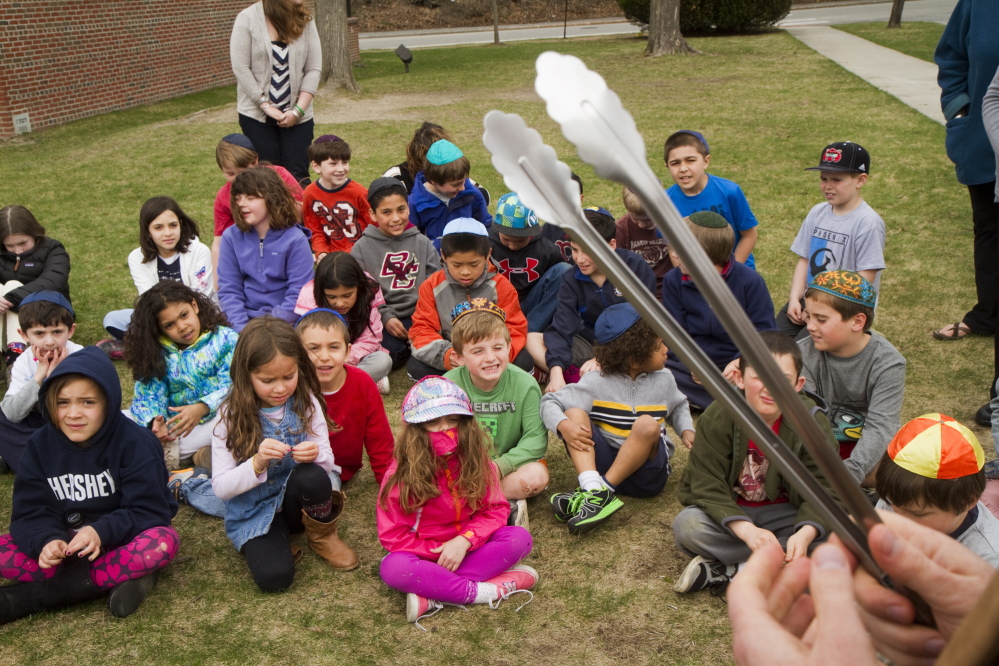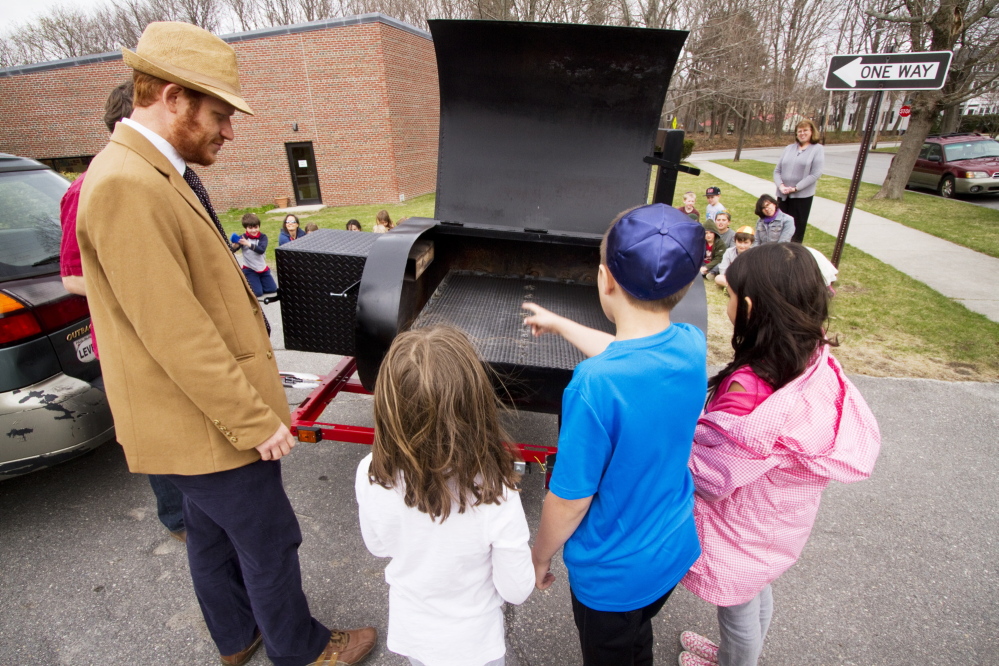Rabbi Akiva Herzfeld from Synagogue Shaarey Tphiloh in Portland stood by a big black barbecue smoker Monday and quizzed a couple dozen students from the Levey Day School about how it could be blessed before it is used for the first time – and, more importantly, why?
“It’s not kosher,” one little boy called out. “We need to kosherize it.”
Why is a rabbi getting so close to a barbecue smoker, a device that is most often used to cook decidedly unkosher pork? This particular smoker, built by Doors Services Inc. (owned by a Levey alum) and never used before, will make its debut Sunday at a kosher barbecue at the school on Deering Avenue. A kosher barbecue is an event so rare that organizers could find reference to only one other like it in the whole country.
“I’ve never in my life seen this,” Rabbi Herz-feld said. “This is a very rare occurrence, so I’m going to look at (the smoker) and prove it as kosher and certify it.”
The smoker cannot be used unless it has never smoked meat before, or unless it has been dedicated to smoking only kosher meat. Herzfeld explained that before the smoker is fired up, he’ll take the utensils to the “mikvah,” a ritual purification bath at the synagogue, and dip them in the water to make them kosher.
“In Judaism, before we eat in a kosher kitchen, it’s not only the food in the kitchen but also the utensils and the pot” that need to be kosher, he explained to the children.
The barbecue is a fundraiser to celebrate the school’s 60th anniversary. Adam Powers and Jeremy Rush, the owners of Elsmere BBQ & Wood Grill in South Portland who consulted on the construction of the smoker, will oversee the preparation of brisket and chicken from New York-based Grow and Behold, a kosher meat supplier that specializes in kosher, grass-fed, sustainable meats.
Volunteers will prepare vegetarian side dishes such as cole slaw, baked beans, greens, grilled vegetables and cornbread in a kosher kitchen, and there will be pies for dessert. All of the side dishes and desserts will be dairy-free in accordance with Jewish dietary law.
The event highlights similarities between the ethical sensibilities of keeping kosher and the way more and more Americans are approaching their consumption of meat – with respect for the animal and a desire for as little pain and suffering as possible.
Some rabbis today, Herzfeld noted, are even going beyond the traditional laws of “kashrut” by supporting a movement to prohibit the consumption of veal, out of concern for the way it is often raised. (Herzfeld himself says he tries not to eat it.)
“The food we eat comes from God and by the blessing of God,” Herzfeld said, “and we have a responsibility when we put food into our mouths to make sure that it’s as holy a process as possible, to try to make sure that the vegetables and grains were grown in a way that’s good for the world and good for the people that grew the produce. And when it comes to meat, the responsibility of the kosher consumer, I think, if he or she is going to consume animal products, is to try and make sure that the animals were raised in a way that they were treated properly. Unfortunately, I think that concern is not emphasized enough by people.”
NOD TO PORTLAND’S FOOD SCENE
The unusual celebration at the Levey Day School has been in the works for months and is partly an homage to Portland’s love affair with food.
“We wanted a gala event, but not your typical gala,” said Karl Schatz, owner of Ten Apple Farm in Gray, whose daughters attend Levey and who is vice president of the school’s board. “We wanted it to be something interesting. Portland is such a food town, and (the planning started) when barbecue had just started to come into Portland.”
Schatz and his wife, Margaret, have long been interested in the training that a ritual slaughterer, known as a shochet, goes through, and in the whole idea of producing kosher meat that is local and sustainable. At a conference where they witnessed the ritual slaughter of a goat (the couple raise goats on their farm) they met Naftali Hanau, the founder of Grow and Behold, and they have been following his work ever since.
“It sort of brought together two worlds that we were interested in,” Schatz explained. “We’ve never really gone out of our way to eat kosher meat because it was never local or sustainable. You didn’t know the source of the meat. It was potentially factory farmed. Although the laws of kashrut are very specific about the ethical treatment of animals, it’s still done in very large slaughterhouses and there’s still an element of the unknown.”
It used to be that every Jewish community had a kosher slaughterer and kosher butcher, Schatz said. He recalls his father telling him that there were three kosher butchers in Portland in the 1940s and 1950s, concentrated in the Middle Street/India Street neighborhood. Today, there isn’t one kosher butcher in all of Maine.
The shochet is trained in very specific methods of slaughter that have been passed down through the ages. Hanau could not be reached for an interview, but Grow and Behold’s website describes how the knife must be perfectly sharp and twice the length of the animal’s neck. The shochet checks for nicks because any tearing of the animal’s flesh would cause pain. The cut is made in a fast and continuous motion to render the animal senseless as quickly as possible.
Kosher meat and poultry are drained of blood because it is against Jewish law to consume the lifeblood of an animal. The meat is salted to help draw out blood, then washed three times to remove the salt.
The hindquarters are rarely consumed because of the sciatic nerve, which is forbidden to eat but difficult to remove.
“There’s a story about Jacob and his battle with the angel in the book of Genesis where the angel grabbed hold of Jacob’s thigh when he was battling him,” Herzfeld said, “and he struck him in the sciatic nerve. The Torah says on account of that, the Jews don’t eat the sciatic nerve of animals until this very day.”
SUPPLY AND DEMAND
All of these rules were written down centuries ago by people who never imagined the sheer amount of meat that is consumed today and the facilities needed to process it.
Today there is not enough kosher meat being produced to meet demand, Herzfeld noted. “Most kosher meat consumers eat meat that’s from factory farms,” he said.
Schatz said that Grow and Behold is the only company he knows of nationally that is producing sustainable, grass-fed kosher meat and poultry.
“It’s not local because it’s coming from New York and the farms are in Pennsylvania and New York,” Shatz said, “but there’s a level of transparency and an additional layer of ethics and philosophy to it than with the kosher meat that you’ll find in Hannaford or Trader Joe’s that you just won’t know where it originated.”
At Grow and Behold, the ritual slaughterers work in small, family-owned processing plants where there are no electric prods or other painful techniques.
“We never shackle and drag our beef,” the Grow and Behold website says. “This cruel practice is the standard in South America, where nearly all the grass-fed kosher meat is produced for the U.S. market.”
Organizers hope the school barbecue featuring the Grow and Behold’s meat will, in addition to raising money, open a dialogue about food and provide an opportunity for teaching the school’s children about the importance of respecting animals. After the event, the kosher smoker will be made available to other Jewish community groups so they can have similar gatherings and the conversations that come with them.
“It’s a very interesting conversation that’s happening in many Jewish communities today: How do Jews eat ethically?” Schatz said. “It’s parallel to the conversation that’s happening across America about how to eat more ethically and around organic and sustainable and local and all those words. How do we do that in a Jewish context, and how do the laws of kashrut figure into that conversation where there are intersections?
“That’s kind of what we’re trying to do with this event, is create more intersections between the world of sustainable agriculture and good food, and create an interest that rarely happens between the Jewish food world and the really interesting food world that we have here in Portland.”
Staff Writer Meredith Goad can be contacted at 791-6332 or at:
mgoad@pressherald.com
Twitter: MeredithGoad
Send questions/comments to the editors.






Success. Please wait for the page to reload. If the page does not reload within 5 seconds, please refresh the page.
Enter your email and password to access comments.
Hi, to comment on stories you must . This profile is in addition to your subscription and website login.
Already have a commenting profile? .
Invalid username/password.
Please check your email to confirm and complete your registration.
Only subscribers are eligible to post comments. Please subscribe or login first for digital access. Here’s why.
Use the form below to reset your password. When you've submitted your account email, we will send an email with a reset code.